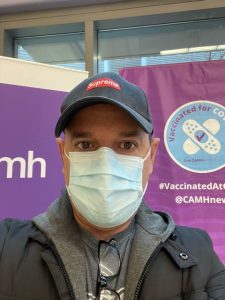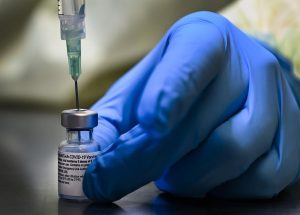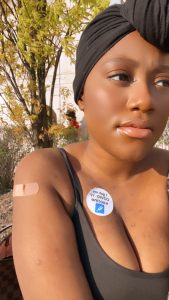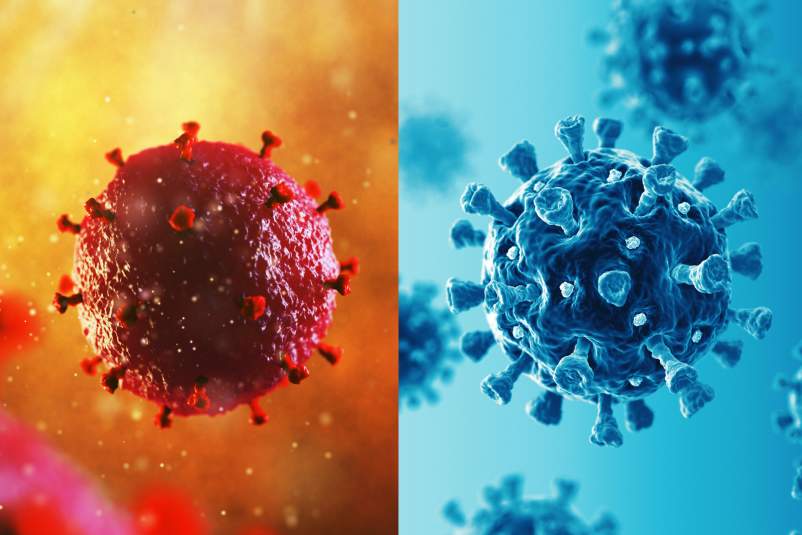When it was their turn to receive the first dose of the COVID-19 vaccine, Muluba Habanyama and Enrico Mandarino had a lot of questions. Both Toronto residents have been living with HIV for 25 years — Muluba was diagnosed when she was two years old, and Enrico was diagnosed at the age of 28 — and are well aware of the potential increased risk of serious illness if they get infected with COVID-19.

“There is the fear of getting sick, but there is also a bigger fear around how the science of COVID-19 keeps evolving,” says Enrico. “It’s wonderful that the world is moving fast and rallying around this, but it is the shortest time frame for any vaccine in our lifetime. We have lived through 40 years of HIV without a vaccine yet!”
Muluba adds, “I went through every conspiracy theory out there. We don’t know how we are going to react to the vaccine, what about side effects? And really, how much is it going to protect us? I have spoken with a lot of friends in the community and there is a lot of worry and concern.”
The two members of the CIHR Canadian HIV Trials Network’s (CTN) Community Advisory Committee ultimately did get their first vaccinations, even without answers to their many questions. But they are eagerly awaiting the results of a new national study, called HIVCOV (CTN 328), that will assess COVID-19 vaccine immune responses and effectiveness among people living with HIV.
Results will help inform vaccination guidelines
“At the current time, we don’t completely understand how HIV itself impacts the immune response to COVID-19 vaccination,” explains the CTN’s Dr. Cecilia Costiniuk, the study’s co-principal investigator and scientist at the Research Institute of the McGill University Health Centre. “Past experience has taught us that many people living with HIV do not have as robust of an immune response to many common vaccines when compared to people who do not have HIV infection.”
This has meant people living with HIV may need higher doses of vaccines, or additional boosters, to get the same protection as others. Studying the immune system of this population after COVID-19 vaccination will help provide guidance on dosing strategies and public health and clinical practice guidelines for the 67,000 Canadians living with HIV.
The HIVCOV team will recruit 400 people living with HIV from clinics in Montreal, Ottawa, Toronto, and Vancouver. Over the year-long study period, their blood samples will be tested for COVID-19 antibodies and other markers of immune function before and after vaccination. This information will be compared to a control group of 100 people who do not have HIV.
Focus on the most vulnerable subgroups
The researchers will focus on studying older patients, those who have suppressed levels of white blood cells that fight infection, and people with multiple medical conditions.
The CTN’s Dr. Curtis Cooper, also a co-principal investigator on this study and scientist with The Ottawa Hospital, says, “Small numbers of people living with HIV who are in stable health and with no other medical conditions have been included in previous clinical trials for the vaccines. But that information is not applicable to the most vulnerable subpopulations, which we will be addressing in this study.”
Enrico is also part of the HIVCOV study team as a community investigator. He says the focus on these key groups is of vital importance, especially in encouraging everyone to get vaccinated. “The older people living with HIV, in particular, have a lot of vaccine hesitancy. They’ve gone through the AIDS epidemic and all the different drugs and treatments. A lot of my friends have this idea that ‘if it isn’t broken, don’t fix it’. For example, I’m still on nevirapine, one of the oldest HIV drugs that was first approved in 1996.”

Study part of larger project
HIVCOV is part of a larger $2.6 million project — COVAXHIV — funded in large part by the Government of Canada through its COVID-19 Immunity Task Force and Vaccine Surveillance Reference Group. Additional support has been provided by the CTN, the Canadian Institutes of Health Research (CIHR), and Stop the Spread Ottawa. (Read the CITF news release here.)
The other part of COVAXHIV will look at vaccine effectiveness in people living with HIV through an analysis of provincial public health records in Ontario and British Columbia. It will be led by CTN Investigators Dr. Ann Burchell, research director at St. Michael’s Hospital’s Department of Family and Community Medicine, Unity Health Toronto, and Dr. Hasina Samji, senior scientist at the BC Centre for Disease Control. They will follow more than 35,000 people living with HIV in both provinces to track COVID-19 vaccine uptake and the subsequent rates of infection and hospitalization. They will also examine social determinants of health to see if age, sex, or geographic and socioeconomic status have any impact on vaccine effectiveness.
“This is the biggest project in Canada to date to evaluate the COVID-19 vaccine in this vulnerable population,” says CTN National Director Dr. Aslam Anis and principal investigator for COVAXHIV. “This is crucial information to help us ensure people living with HIV are protected from serious illness and death.”

Community hoping for answers
Both Muluba and Enrico have spent the past 15 months hunkered down at home, doing what they can to protect themselves. They are due for their second COVID-19 vaccines soon, which means they will be fully vaccinated, by current medical guidelines. But they know this could change completely for people living with HIV once there are study results. For now, both say they won’t be rushing to return to pre-pandemic ‘normal’ just yet.
“The pandemic has affected vulnerable people so much more than the general public,” comments Enrico. “I look at my friend who is 70 years old and has had HIV for more than 40 years. He needs encouragement and information so he can make an informed decision. The irony is vulnerable people may have more fear of the vaccine, and that turns their vulnerability into yet another barrier to staying safe. That’s why I participate in research…for the greater good.”
“That’s the thing with research. You don’t usually personally benefit, but in the long term, you will help the community,” Muluba adds. “This is a very important study and we need to get the ball rolling. COVID-19 isn’t something that is going away, so we need to find some answers to our questions.”



